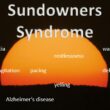Alzheimer’s Hallucinations & Delusions
Understanding Hallucinations and Delusions in Alzheimer’s Disease: A World Unseen
Alzheimer’s disease is a neurological illness that gradually impairs perception, thought, and memory. It can also occasionally result in delusions and hallucinations, which can be upsetting for patients and carers alike. It is essential to comprehend these experiences and the management techniques that are accessible in order to support and enhance well-being.
Table of Contents

Perceiving and Adopting the Unreal
Alzheimer’s Hallucinations & Delusions
- Hallucination: The experience of unreal sensory sensations is known as a hallucination. Although they can impair any sense, Alzheimer’s patients are more likely to experience visual hallucinations. They may perceive nonexistent things, animals, or people.
- Delusions: These are incorrect ideas that people cling to firmly in the face of opposing information. A patient may think, for instance, that their partner is unfaithful, that their possessions are being taken, or that they are still employed at their previous job.
Alzheimer’s Hallucinations & Delusions
The particulars of delusions and hallucinations might differ widely from person to person.
Why Do These Happen?
Alzheimer’s Hallucinations & Delusions
Alzheimer’s disease hallucinations and delusions are a complicated and poorly known specific cause. Still, a number of factors are probably in play:
- Brain Alterations: Alzheimer’s disease affects the parts of the brain that handle sensory data processing and reality interpretation. Misunderstandings and skewed perceptions may result from this.
- Communication Issues: Patients may find it difficult to distinguish between their thoughts and reality due to communication channels being disrupted by the condition.
- Sensory Alterations: Hearing and vision issues can cause people to misinterpret their surroundings, which can result in hallucinations.
- Unfulfilled Needs: Delusions or hallucinations might occasionally be a sign of an unfulfilled desire that the patient is unable to articulate. When someone sees insects, for instance, they can be expressing discomfort (itching skin) or hunger (wanting to swat at flies).
- Psychological Distress: As a patient attempts to make sense of their shifting environment, anxiety, depression, or terror may show themselves as hallucinations or delusions.
The Effects of Delusions and Hallucinations
Alzheimer’s Hallucinations & Delusions
People suffering from Alzheimer’s disease may experience major effects from hallucinations and delusions:
- Enhanced Fear and worry: It can be terrifying to experience unreal things, which can cause worry and agitation.
- Social Withdrawal: Because they are afraid of or mistrustful of other people, patients may withdraw and avoid social situations.
- Safety Concerns: Hallucinations can cause agitation that can cause harm to oneself or others.
- Sleep disturbances: Fear of the unknown or nightmares might cause problems sleeping.
- Taking care of these situations can be difficult and emotionally taxing for carers.
Offering Assistance and Handling Indications
Alzheimer’s Hallucinations & Delusions
Although there is no treatment for Alzheimer’s-related hallucinations and delusions, the following techniques can help control them and enhance general wellbeing:
- Validation and Empathy: Accept the patient’s experience without contesting it or attempting to disprove it.
- Environmental Modifications: For a feeling of security and comfort, make sure there is enough lighting, reduce clutter, and provide familiar objects.
- Taking Care of Underlying Needs: Look for unfulfilled, sometimes misconstrued physical needs such as hunger, thirst, or discomfort.
- Accepting and validating: the patient’s feelings without attempting to change their perceptions is the practice known as validation therapy.
- Medication: Medication may be required in certain situations to treat severe delusions or hallucinations that interfere with day-to-day functioning.
Alzheimer’s Hallucinations & Delusions
Seeking advice from a medical expert is essential when creating a customised strategy to treat delusions and hallucinations. In addition to prescribing medication if necessary, they are able to evaluate the patient’s needs and suggest suitable interventions.
In summary
Alzheimer’s Hallucinations & Delusions
Delusions and hallucinations can be a difficult part of Alzheimer’s. However, carers can offer support and assist their loved ones in navigating these situations by comprehending their causes and putting tactics like affirmation, attending to underlying needs, and establishing a calm environment into practice. Recall that the best ways to manage hallucinations and delusions and enhance the quality of life for people with Alzheimer’s disease are patience, empathy, and cooperation with medical workers.


